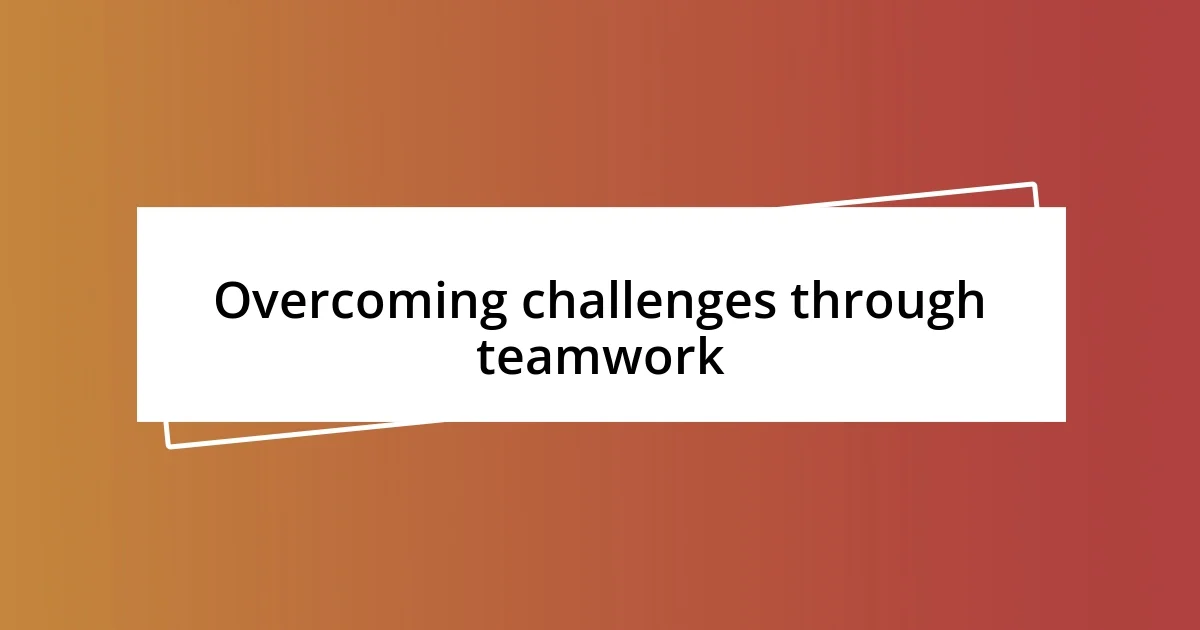Key takeaways:
- Sports foster personal growth and resilience through shared experiences, promoting emotional connections and confidence among teammates.
- Choosing the right team sport enhances motivation and engagement, aligning personal interests with team dynamics to build stronger relationships.
- Lessons from team sports—like communication, collaboration, and leadership—are transferable to everyday life, influencing personal and professional interactions positively.

Understanding the role of sports
Sports play a pivotal role in shaping our lives, often serving as a platform for personal growth. I remember stepping onto the soccer field for the first time; the thrill of competing was matched only by the sense of belonging I immediately felt. Isn’t it fascinating how a shared goal, quite literally, can unite people from diverse backgrounds?
As I engaged in various team sports, I discovered that the camaraderie built within the teams extends beyond game day. There were moments when we celebrated wins together or consoled each other after losses. These experiences taught me that vulnerability is strength. Have you ever considered how these shared emotional peaks and valleys foster connections that boost our confidence?
Moreover, through sports, I learned the importance of resilience. I once faced a significant setback when I was injured before a crucial game. The emotional turmoil was real, but with the support of my teammates, I found a renewed drive to come back stronger. Reflecting on this, I realize that sports instilled in me not just physical stamina, but an enduring belief in my own capabilities. Isn’t it incredible how team dynamics can teach us lessons that ripple into all aspects of our lives?

Choosing the right team sport
Choosing the right team sport can be a transformative experience. When I was deciding which sport to join, I asked myself what excited me the most. I quickly learned that aligning my interests with team dynamics had a profound impact on my overall confidence. For instance, I gravitated towards basketball, where the fast-paced environment and collaborative nature pushed me to communicate better—and in turn, I became more self-assured.
Here are key factors to consider when selecting a team sport:
- Interest: Choose a sport that genuinely excites you. It’ll be easier to stay motivated and engaged.
- Team Size: Think about how well you work in larger or smaller groups. Some thrive in close-knit teams, while others enjoy the energy of bigger squads.
- Skill Level: Be honest about your current abilities and choose a sport that matches your skill level, so you feel challenged but not overwhelmed.
- Availability: Look at local clubs or schools offering the sport. Accessibility is crucial for consistent practice and participation.
- Goals: Are you playing for fun, competition, or fitness? Understanding your own goals will help guide your choice.
Reflecting on my journey, I found that selecting a sport I was passionate about led to deeper connections with my teammates, ultimately laying the foundation for unshakeable confidence.

Building camaraderie with teammates
Building camaraderie with teammates is one of the most enriching aspects of participating in team sports. I vividly recall my first volleyball practice; even the nervous energy in the gym created a unique connection among us. It was remarkable how quickly we transformed from strangers into a support system, cheering each other on during drills and sharing laughs over missed serves. This initial bond set the stage for deeper friendships, built on trust and shared experiences.
As the season progressed, I noticed that the little gestures—like high-fives after a good play or team huddles before games—added layers to our camaraderie. I remember one particular match where we were trailing behind, and the tension in the air was palpable. We leaned into each other’s energy, exchanged encouraging words, and turned the game around. Those moments taught me not just about teamwork but also about how collective spirits can uplift individual confidence. Have you ever experienced that surge of motivation from simply being part of a team?
Moreover, the shared rituals, like post-game debriefs and team dinners, solidified our connections off the court. I recall a night filled with laughter and storytelling, where we learned about each other’s backgrounds and dreams. This was more than just bonding; it was a journey of growth. I realized that through these connections, we all felt safer to be vulnerable and to push ourselves further. The camaraderie we built wasn’t just social; it truly became a source of strength for each of us.
| Aspect | Team Dynamics |
|---|---|
| Camaraderie Building | Impact on Confidence |
| Shared Goals | Unites members with a common purpose |
| Mutual Support | Encourages open communication and trust |
| Celebrating Victories | Enhances feelings of accomplishment and belonging |
| Dealing with Losses | Fosters resilience and emotional strength |

Setting personal goals in sports
Setting personal goals in sports is vital for fostering confidence. I remember setting my first goal in soccer: to improve my dribbling skills. Rather than just hoping to do better, I broke it down into smaller tasks—practicing for 15 minutes after each practice. This not only made the goal achievable but also gave me a sense of accomplishment each time I sharpened my skills.
When I achieved my initial goal, it felt electric! That small victory ignited a desire to set more ambitious targets, like scoring in a game. I think about how important it was to create a clear vision of where I wanted to be. Have you ever set a goal that seemed lofty but then realized it was just a series of smaller steps waiting to be conquered?
I’d also encourage anyone in sports to periodically reassess their personal goals. My experience taught me that as I improved, I needed to understand my evolving strengths and weaknesses. For instance, as my confidence in dribbling grew, I shifted my focus toward teamwork, setting goals around communication and giving assists. This evolving mindset not only kept me engaged but also propelled my confidence to new heights. Have you allowed your goals to adapt as you grow?

Overcoming challenges through teamwork
Teamwork has a magical way of helping us overcome challenges that might feel insurmountable alone. I remember being part of a basketball team that found itself in a tough situation during a critical game. We were down by a significant margin, and many of us felt a wave of doubt washing over us. Instead of allowing that frustration to consume us, we huddled together, shared our fears, and strategized. It was incredible to witness how each member’s unique strengths contributed to a collective effort. We ultimately turned the game around, which reinforced my belief that together, we could tackle any obstacle.
Facing adversity with my teammates also taught me the importance of vulnerability. One evening after a particularly tough loss, we sat in a circle, sharing our feelings of disappointment and frustration. I’ll never forget how my teammate opened up about her struggles, and it encouraged the rest of us to share our own. Through this open dialogue, we not only bonded closer but also formulated a plan to improve. That experience solidified my understanding that teamwork isn’t just about physical support; it’s about emotional resilience as well. Have you ever felt transformed by simply opening up to others?
In team sports, overcoming challenges often feels like a shared journey. I recall the exhilarating feeling of working side by side with my teammates to reach a common goal, whether it was scoring a point or mastering a new play. The nights spent practicing those complex maneuvers created an unshakeable sense of solidarity among us. It became clear that our triumphs—and even our failures—were collective, fostering a spirit of strength. How did it feel the last time you celebrated a hard-earned victory? For me, those moments always remind me that the experience is richer when shared, making each achievement feel even more significant.

Reflecting on personal growth
Reflecting on personal growth takes me back to those moments on the field or court when I truly realized how far I’d come. I remember a time during my first season of volleyball; I was shy and reluctant to voice my thoughts during matches. One day, our coach challenged us to lead a practice drill, and I hesitated. But when I finally stepped up, it was like a light bulb turned on. I saw how my words could inspire my teammates and push us all forward. Have you ever found your voice in unexpected ways?
Another memory that stands out is a game where we were losing, and I felt the familiar pang of self-doubt creeping in. Instead of shutting down, I decided to focus on what I could control—my attitude and effort. I rallied my teammates, reminding them of our abilities. The surge of positivity shifted the team’s dynamics, and we played with renewed energy. This experience wasn’t just about the score; it taught me that my mindset could influence others. When have you realized your attitude could shift the situation for your group?
Looking back, I see personal growth as an ongoing process shaped by every game, practice, and interaction with my teammates. Each experience pushed me to confront my fears and embrace growth. I vividly recall my first time as a captain; the weight of responsibility was daunting. But I learned to lead with empathy and support, allowing my teammates to shine. It was a defining moment that shaped not only my leadership style but also my confidence. How do you embrace growth when faced with leadership challenges?

Using lessons learned beyond sports
Stepping onto the field was about more than just the game for me; it became a training ground for life lessons. I learned to adapt under pressure—not just in competition, but also in everyday situations. During a group project at school, when everything seemed to be falling apart, I recalled moments from games where I had to think on my feet. I proposed a quick re-evaluation of our roles based on each person’s strengths, which turned the project around. Isn’t it amazing how skills developed in one area can seamlessly apply to another?
I remember a time in practice when our coach emphasized the importance of communication. She pointed out that misunderstandings can lead to missed opportunities, both on the court and in life. Since then, I’ve made a conscious effort to communicate openly in all my relationships. It was eye-opening to see how fostering clear dialogue with friends or family can prevent unnecessary conflicts. Have you ever realized how vital it is to express your thoughts to strengthen bonds?
As I transitioned to different aspects of life, I noticed that the spirit of collaboration I experienced in team sports blossomed in my professional life as well. For instance, when working on a community service project, I saw firsthand how diverse perspectives and teamwork can create impactful change. We all brought varied skills, just like we did on the field. Engaging each person’s unique contribution allowed us to create a more significant, collective impact. Isn’t it fascinating to see how the lessons learned in sports can shape our ability to connect and effect change off the field?














